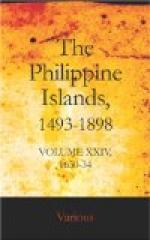Our father Fray Francisco Bonifacio, with the mildness which we have seen, with which he began and divided his government, ended it with the same, not leaving any religious any ground for complaint. For he loved them all equally, and equally strove for their spiritual welfare, acting toward them in every respect as a true father and shepherd. He had cast his eyes on father Fray Jeronimo de Medrano as his successor. The latter was then definitor, and he was a person of great talent for what the office requires, and had preached at Manila in a very satisfactory manner. But since there are so many different understandings in a province, all men cannot judge of a thing by the same method, for every one feels regarding it as his own judgment dictates. Consequently, there was a following which tried to elect father Fray Francisco Coronel, a man of vast learning, and of whom very great hopes were entertained for the future. But that following never could gain the full game, nor even check the other faction. Thereupon they settled on a scheme which did not succeed badly, and that was to cast their votes for our father Fray Juan de Henao, who belonged to the other faction, and had the father president on his side. By this means, the election was conferred upon the man who was least expected [to gain it]. One would believe that the Lord chose to give him therein the dignity which He had taken from him six years before—the reader will remember what we have said about that.
At this time the fathers born in the Indias, although they were few, had obtained a bull from his Holiness, so that between them and the fathers from Castilla there should be alternation [in the celebration of Corpus Christi]. Its execution was committed to the archdean of Manila, Alonso Garcia, a creole, who was much inclined to it. Accordingly he proceeded without allowing any appeal or argument, although those presented by the Castilian fathers were very cogent. Finally he proceeded to extreme measures, by declaring the fathers excommunicated. Here the province refused to admit the letters of excommunication. Finally, our father Henao was elected in this contention, with father Fray Esteban de Peralta acting as presiding officer of the chapter. The definitors elected were: father Fray Juan de Tapia; the second, Fray Juan de Medina; the third, Fray Nicolas de Herrera; [75] and the fourth, Fray Martin de Errasti. [76] The visitors were father Fray Jeronimo Medrano and father Fray Cristobal de Miranda. [77]
The father provincial and the other father definitors looked after the affairs of the province with great prudence, and discussed the most important matter of that time—namely, the choice of a person to go to the court of Roma to represent the causes which had moved them not to accept the alternation, giving him the money for expenses which the other fathers are accustomed to carry, with additional pay, and as the case required. The father master,




